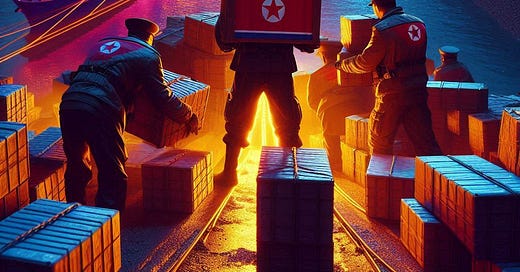Taiwan to counter NK oil smuggling with new laws; Customs officials clamp down on DPRK/PRC border; Tehran wants observer status at EAEU; Iran & Russia push forward on various projects
Prohibited Transactions for the week of 15 July 2024 (#55)
This image was created in Microsoft Copilot Designer on 20 July 2024 using the prompt “North Korean smuggled goods by a river, cyberpunk”
North Korea
Seoul sanctioned a Hong Kong shipping firm, HK Yilin Shipping, and a North Korean vessel, over an illegal coal transfers which violated UN sanctions.
Taiwan’s government drafted amendments to the nation’s Counter-Terrorism Financing Act, in an attempt to counter oil transshipments to North Korea that originate at Taiwanese ports. The amendments would criminalize transactions with a citizen or company that is from a country subject to UN sanctions. //A much needed step by Taipei to cut off this source of oil for the North Koreans. But these new laws will only be effective if there are actual prosecutions of Taiwanese citizens who are helping the DPRK evade sanctions.
According to covert reporting from inside North Korea, PRC Customs is strictly enforcing border controls between China’s Jilin province and the DPRK’s Yanggang province, and not allowing Chinese traders to move any sort of metal products across the border. //This reporting, along with other covert reporting last week in Issue #54, shows that PRC customs officials appear to be under orders from Beijing to slow down the movement of goods between the two countries, perhaps as a means to signal their displeasure to Pyongyang about North Korea’s growing relationship with Moscow. Enforcement on the border may be uneven as some local customs officials take a more zealous interpretation of their instructions from the central government.
North Korean leader Kim Jong-un inspected the Wonsan Kalma Coastal Tourist Area, emphasizing that the country needs to boost tourism over the long term. This is part of a push to earn foreign currency from Russian tourists in particular, as the country continues to face international sanctions.
--
Approximately USD235 million was stolen from an Indian digital currency exchange, WazirX. According to crypto compliance firm Elliptic, actors tied to North Korea are responsible for the hack.
According to covert reporting from inside North Korea, hundreds of North Korean military construction workers were sent to Russia before the summit between Kim Jong-un and Vladimir Putin. The workers sent appear to have experience working in Russia and are able to quickly earn foreign currency, either by managing small groups of enlisted laborers, or as freelance agents connecting DPRK companies with Russian merchants.
Iran
A group of Russian “economic activists” visited the northern Iranian port of Amirabad, to invest in the production of oil derivatives. The port is operating at only 30 percent capacity, and the Iranians are encouraging domestic and foreign investors to invest in it. //Previous reporting (see Issue #17) notes that Moscow uses the port to transfer Iranian-made drones across the Caspian Sea. This article from Tehran Times discusses the port, but also summarizes the state of economic cooperation between Tehran and Moscow.
Iran’s oil minister said that a recently signed agreement with Russia will result in Iran receiving 300 million cubic meters of Russian gas per day. //This could be from the agreement signed between the Iranian National Gas Company (NIGC) and Russia’s Gazprom (see Issue #53)
Iran, Russia, Kazakhstan and Turkmenistan signed a “roadmap” to potentially develop an eastern route of the International North-South Transport Corridor (INSTC).
Officials from Iran and the Kyrgyz Republic signed a memorandum of understanding to establish a joint logistics center that will support the use of Iran’s southern ports by Kyrgyzstan’s private sector.
--
The Advantage Sweet, a Marshall Islands-flagged oil tanker seized by Iran in April 2023 (see Issue #39), appears to have been released and is now anchored close to a UAE port.
Tehran is seeking observer status in the Eurasian Economic Union (EAEU), following Iran’s recent signing of a free trade agreement with them (see Issue #47).
A Polish state-owned engineering firm is being investigated for exporting pumps to Iran — to a motor-maker company for use in farm equipment — but which may have been diverted for drones that Russia then used in Ukraine.
The head of the Iran-Afghanistan Joint Chamber of Commerce stated that Afghan businesspeople have invested more than USD3 billion in Iran.
Iranian and Australian officials discussed expanding economic cooperation in non-sanctioned fields, with the Iranian representative suggesting areas such as agriculture, information technology and education, software development, health, pharmaceuticals, medical equipment and tourism.
The US State Department sanctioned an Iranian company for its work in the country’s chemical weapons research and development.



